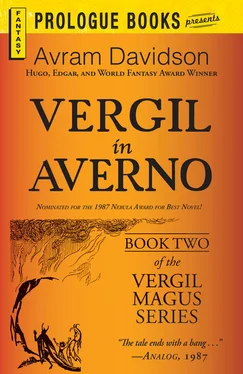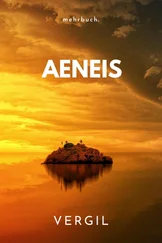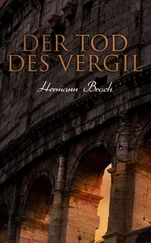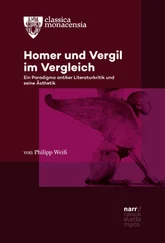Avram Davidson - Vergil in Averno
Здесь есть возможность читать онлайн «Avram Davidson - Vergil in Averno» весь текст электронной книги совершенно бесплатно (целиком полную версию без сокращений). В некоторых случаях можно слушать аудио, скачать через торрент в формате fb2 и присутствует краткое содержание. Жанр: Фэнтези, на английском языке. Описание произведения, (предисловие) а так же отзывы посетителей доступны на портале библиотеки ЛибКат.
- Название:Vergil in Averno
- Автор:
- Жанр:
- Год:неизвестен
- ISBN:нет данных
- Рейтинг книги:3 / 5. Голосов: 1
-
Избранное:Добавить в избранное
- Отзывы:
-
Ваша оценка:
- 60
- 1
- 2
- 3
- 4
- 5
Vergil in Averno: краткое содержание, описание и аннотация
Предлагаем к чтению аннотацию, описание, краткое содержание или предисловие (зависит от того, что написал сам автор книги «Vergil in Averno»). Если вы не нашли необходимую информацию о книге — напишите в комментариях, мы постараемся отыскать её.
Vergil in Averno — читать онлайн бесплатно полную книгу (весь текст) целиком
Ниже представлен текст книги, разбитый по страницам. Система сохранения места последней прочитанной страницы, позволяет с удобством читать онлайн бесплатно книгу «Vergil in Averno», без необходимости каждый раз заново искать на чём Вы остановились. Поставьте закладку, и сможете в любой момент перейти на страницу, на которой закончили чтение.
Интервал:
Закладка:
Stinking and sluggish the canal was, and narrow and shallow and slime, provided with more than one portcullis to check any possible use in either invasion or escape (and, for that matter, interloping), and used only for the transportation of cargo too heavy or too bulky or too otherwise unsuitable (crushed sea-nail for the dye-vats: example) for the winding and narrow overland route through the crags that surrounded the city — city without as well as within its walls. The canal as it was and long had been probably suited its masters exactly so it was. So, envision as he might (and did) some swifter, cleaner current come gliding in via, perhaps, a mountain stream or two, soon and swift he dismissed the thought.
Hiring masters and hireling mage. . “But not yet Incantor et Magus”. . “Not yet” . . echoes, echoes. . but, still, if not magus de jure , mage de facto . . and as he had been, in effect, hired: hireling …) all in an atrium.
Brosa had brought him thither. It was not Brosa, however, who was about to speak: Boso was. Brosa and “they” had brought him, Vergil, earlier, to see the torture chambers, as elsewhere, some other “they” had taken him to see the bears and lions, the dancing girls, the chambers with the painted walls. Boso had been there as well, one or two others. Three? Had the same number left as entered? Did one or two remain to see the sport? Was it sport alone? Some particular taste for witnessing unspeakable pain, intense and shameful agony? Had the trade of any one or two or even three of the magnates been particularly rather than generally affected by the “conspiracy and interloping” of which that wretched fellow had stood accused? Was it that this magnate or that or those as individuals felt their commerce and industry risked loss if outsiders were allowed to buy without license? Was it particular details that he or they wished to hear? Or -
These questions in turn had not been slow in raising at least one other question in Vergil’s mind: Could the visit to the torture chambers have been no mere showing of a certain sight, but a caution? A warning? And if so: to whom? Vergil was not a resident, a denizen of the city Rome. But he was a Roman citizen, a Citizen of Rome. Mere birth within the Empire did not confer this right and status. Status and right were of immense protection. But although Averno was under the rule of Rome, Averno was not Rome. He was not in Rome now. He was in Averno. Averno was not Rome.
Boso was the first, after some small silence, to speak. “Now see thee here, Master Vergil,” he began, in his stolid way; stolid or not: an enormous change. Yesterday, face-to-face the two of them, it had been “Wise One.” Today, here, here in the company of his fellow-magnates, it was merely “Master Vergil”: well. In this Boso was perhaps merely conforming to local usage, discarding the semblance of great respect which something from his own past, perhaps; perhaps the brief use between them of the tongue of Sidon, had prompted. But — See thee here …! Why, Vergil’s own servant would apologize for addressing him in the thou- form! Was the hired man, citizen or no, to be shown his place? Or. . or was this, this over-familiarity, the semblance? The dissembling?
One would see.
Boso, squatting, was drawing in the sand of a part of the atrium with his finger. “Them fires which are the gifts to us of the good gods of hell, they are, like here” — he scratched — ”and here. . and here, and here …”
As for the “rogues, retainers, henchmen, partisans, thieves, runaways, and gamblers,” such as were alleged to frequent the places of notables everywhere, he saw no sign here. Neither did he see any likenesses of the urban great in marble or even in wax, as he did sometimes in other cities. The magnates were not there and then as Vergil had seen some of them (and was to see, eventually, all of them) elsewhere. Of course no torches were needed in level daylight, but neither did they wear crimson to show they were rich, nor dingy black (“It shows no dirt”) to show they cared naught for being rich. One of them in fact wore close to nothing at all, and this was Haddadius, in a breechclout. Now and then he raised a thick and hairy arm and examined his armpit; the gods knew how many years in filth and foulness had laid the foundations for a gesture that had become a lifelong habit. Haddadius now found nothing in his oxters, he (as Vergil had seen) had his own baths, and used them and was clean. But ever and again: the telltale gesture. As for Grobi, whom Vergil knew at once, before even seeing his eye, by his heavy breathing — Grobi was dressed in the lightest of silks, the lightest and the costliest, but his hard and heavy hands continually rubbed his marked and marred wrists and ankles, and perhaps that was why Grobi always did move so slow: Grobi still felt the shackles and the chains. Lars Melanchthus was silent and sober-faced this time, but his eyes still full-red, perhaps from years of peering into the smoke of forges. Perhaps his eyes would never be clear again, perhaps his vision neither.
Boso went on scratching and speaking; gradually Vergil put a picture together, as the mosaic-maker does from fragments of colored glass.
The fire and steam and smoke engirdled the city round like a fiery zone, irregular in shape, and sometimes varying: now a circle; and now extending and also narrowing: an oval. From a fumarole whence last year spouted flame, this year perhaps came nothing but a hot and sulfurous stink; sometimes areas larger than an urban “island” of tenements might be affected; then there would be a laborious moving of forges, vats, workshops, and bloomeries to areas where the fires and fiery gasses freshly escaped the rents and fissures of the tortured earth.
“… and some. . here. …” Boso grunted. He finished his scrabbling and sketching and stared a moment. Then he sighed. “This day,” he said. “ This year. They don’t stay still,” he said. “And that is the kernel in the nut and the nut in the hull, Master Vergil. Them fires wander a-roundabout, and this cause us the worst kind of troubles. And of lately years they wander roundabout all more than before. Fewer. And weaker. Which is why we have had you here. We’ve put you to test. You’ve passed test. You’ve read certain, like, secret message. Given right answer. All so. Now, Ser. Master. What’s to be done about all this?”
And he sat back on his haunches, evidently convinced that he had made everything as clear as it could possibly be, and gazed at Vergil with his bull-like eyes.
But before Vergil could speak, someone else spoke.
“Hecatombs,” said someone, in a thick, slow, heavy, halting voice. Repeated it.
“Hec. . a. . tombs …”
Paradox.
Illyriodorus, once, when asked, “Master, what is it that you seek?” had answered, stroking his classical beard, “I do not seek. I find.” A moment’s silence, in some measure awed, in all measure respectful, followed this epigram.
And the moment was followed by Vergil’s (audacious youth!) — by Vergil’s asking, nonetheless, “And. . Our Sage. . When you do not find?”
The silence this time was a shocked one. Illyriodorus, however, seemed not shocked. One more stroke he gave his beard. “Ah, then,” he said, quite calmly, “then I seek.”
But that was in Athens. And Vergil was now in Averno. They were nothing like. Nor was either the least like Sevilla. Sevilla. Why did he think of Sevilla now, the Very Ancient and Very Wise City?
Sevilla. Often it was hot there, though never of course was the heat of such a quality as here, here, in the fire-fields of Averno. Oft, when then wearied, had he walked with slow steps to a certain space round the ramparts of Sevilla, where once he had watched a cafila of strange beasts: they were called camels. Awkward and splay-footed their walk, and their upper lips, split like those of giant hares, writhed, groaning, perhaps in pain. And each beast bore upon its back a great hunch. Now, as he passed the fire-fields of Averno and saw among the fumes and fumaroles a line of slaves, staggering and lurching through smoke and steam, each with just such a hunch or puckel on his back — though these were leather sacks filled with, as it might be, lumps of ore — he was reminded of those camel-beasts. The necks of these men who bore the burdens here were of course not longer than other men’s, but like camels they twisted them from side to side, like camels their upper lips were split, and like camels they writhed their lips; indeed, like camels, too, they groaned. Too clearly why: Some canny Avernian had gathered for himself a stable of hare-lipped slaves, for such sold always cheaper. Of course here and for such labor it mattered not the slightest that they could not, their palates being cleft, speak distinctly. No one needed them to speak. Damn their speak. Let them slave.
Читать дальшеИнтервал:
Закладка:
Похожие книги на «Vergil in Averno»
Представляем Вашему вниманию похожие книги на «Vergil in Averno» списком для выбора. Мы отобрали схожую по названию и смыслу литературу в надежде предоставить читателям больше вариантов отыскать новые, интересные, ещё непрочитанные произведения.
Обсуждение, отзывы о книге «Vergil in Averno» и просто собственные мнения читателей. Оставьте ваши комментарии, напишите, что Вы думаете о произведении, его смысле или главных героях. Укажите что конкретно понравилось, а что нет, и почему Вы так считаете.












